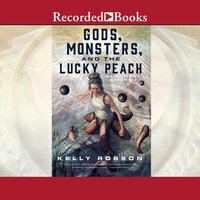Take a photo of a barcode or cover
Gods, Monsters, and the Lucky Peach is a slower moving novella. There’s a far amount of the book that is focused putting together the research project. It’s realistic. Research proposals and plans are time consuming. It took me a little bit to get hooked but the research proposal planning section was really great for seeing the character’s history and dynamics. You are thrown right into the world at the start and it takes a while for some of the background to be explained. At first I wasn’t sure what the underground hells exactly were or what made a plague baby a plague baby. But it was explained through Minh’s interactions with her much younger assistant, Kiki, and her friend/research partner, Hamid. Plus it made me slow down to enjoy the book while I was on the airplane instead of speed reading.
Time travel ethics is a honored science fiction tradition that can sometimes feel stale. Gods, Monsters, and the Lucky Peach does not fall into the trap. It puts a fresh spin from taking it through the point of view of an ecologist and also the structure of the novel. I appreciated the two threads of narratives running parallel to each other and ending up at the same point in the end. We get to see both inside Minh’s head but also the viewpoint of a character from 2000 BC Mesopotamia.
I geeked out over the ecology aspect of the book. It’s not often that I get to read a speculative fiction book that features topics that I am heavily interested in. The book doesn’t get heavy in explaining the science of restoration. The concepts are laid out but doesn’t overwhelm the reader in my opinion. There were only a few things I noticed that were inaccurate, but I would let slide. I loved the robotic tech that Minh and company had for their surveys. I would kill for a life-like wasp bot that collects tissue samples or small bugs discreetly. Plus, Minh and Hamid are very much like most of the ecologists and biologists I know, very passionate about their system/study organism. I laughed at Hamid’s obsession with horses. Once you find your organism, it’s a black hole.
When it comes to the villain aspect of the story and the shadowy organization, I felt that coming a mile away. Perhaps, it’s that I’m in the museum field and I saw the warning bells because I know the nasty history of museums and anthropology. Or maybe it was that I have consumed so much Star Trek that I immediately am like this is a prime directive situation. I think that the book worked for me was how the characters interacted with the villain. That me as a reader was going “Noooooo” because the some of the characters Did Not Realize. But also the ones that did realize, their reactions are so vivid and well written which lets the reader into another corner of the personalities and back history.
What I appreciated the most about the book was the mentor and mentee dynamic between Minh and Kiki. It was realistic and when they fought the emotion came through. The second aspect I appreciated was how casually and natural it felt with the characters being gay or asexual. They mentioned it and no one made a big deal. There were some well meaning jokes cracked about Hamid’s partner and Kiki’s asexuality. It was nice and refusing after reading some YA fiction recently where it was a Big Deal. I appreciated the way that Minh’s disability and health issues were written. They were very relatable at times as someone who struggles with self-care at times.
Gods, Monsters, and the Lucky Peach ended on a cliffhanger that both left me fulfilled but not completely satisfied. I want to know what happens next to Minh and company. I’m hoping for a sequel!
Time travel ethics is a honored science fiction tradition that can sometimes feel stale. Gods, Monsters, and the Lucky Peach does not fall into the trap. It puts a fresh spin from taking it through the point of view of an ecologist and also the structure of the novel. I appreciated the two threads of narratives running parallel to each other and ending up at the same point in the end. We get to see both inside Minh’s head but also the viewpoint of a character from 2000 BC Mesopotamia.
I geeked out over the ecology aspect of the book. It’s not often that I get to read a speculative fiction book that features topics that I am heavily interested in. The book doesn’t get heavy in explaining the science of restoration. The concepts are laid out but doesn’t overwhelm the reader in my opinion. There were only a few things I noticed that were inaccurate, but I would let slide. I loved the robotic tech that Minh and company had for their surveys. I would kill for a life-like wasp bot that collects tissue samples or small bugs discreetly. Plus, Minh and Hamid are very much like most of the ecologists and biologists I know, very passionate about their system/study organism. I laughed at Hamid’s obsession with horses. Once you find your organism, it’s a black hole.
When it comes to the villain aspect of the story and the shadowy organization, I felt that coming a mile away. Perhaps, it’s that I’m in the museum field and I saw the warning bells because I know the nasty history of museums and anthropology. Or maybe it was that I have consumed so much Star Trek that I immediately am like this is a prime directive situation. I think that the book worked for me was how the characters interacted with the villain. That me as a reader was going “Noooooo” because the some of the characters Did Not Realize. But also the ones that did realize, their reactions are so vivid and well written which lets the reader into another corner of the personalities and back history.
What I appreciated the most about the book was the mentor and mentee dynamic between Minh and Kiki. It was realistic and when they fought the emotion came through. The second aspect I appreciated was how casually and natural it felt with the characters being gay or asexual. They mentioned it and no one made a big deal. There were some well meaning jokes cracked about Hamid’s partner and Kiki’s asexuality. It was nice and refusing after reading some YA fiction recently where it was a Big Deal. I appreciated the way that Minh’s disability and health issues were written. They were very relatable at times as someone who struggles with self-care at times.
Gods, Monsters, and the Lucky Peach ended on a cliffhanger that both left me fulfilled but not completely satisfied. I want to know what happens next to Minh and company. I’m hoping for a sequel!
adventurous
informative
medium-paced
Plot or Character Driven:
Character
Strong character development:
No
Loveable characters:
No
Diverse cast of characters:
No
Flaws of characters a main focus:
Complicated
This book did a lot of things well. It had characters with unique personalities and voices, it painted a future world greatly changed with just a few strokes and no info-dumping, and it showed how scientists think.
The time travel itself seemed almost anti-climactic. Minh and her team are so focused on their mission that they don't get a lot of time to marvel at being back in ancient Mesopotamia.
This book was a human tragedy that you could see coming, although the characters didn't. Kiki, desperate to be liked and to be useful, felt rejected by Minh and so gravitated toward Fabian, a cold-blooded historian who has "never had a casualty" in a team he's taken to the past. Minh herself is so focused on work that she doesn't see how Kiki's idealism is going to cause problems. She's also so desperate not to show weakness that she messes with her own neurochemistry to the point that the team and residents of the time they inhabit are put in danger. You can see something bad coming (especially because of the somewhat gratuitous flashbacks that take place throughout the book) but everything happens quickly in the end, and Minh has to figure out how to act like a human instead of a monster in a hurry. Ultimately, it will be the humanity of the ancient Sumerians which will determine their fate.
I didn't really like anyone in this book. I also was frankly appalled by the fact that Kiki was literally willing to cut off her own legs in order to be included in the group- this bothered me a lot as someone who has had plenty of surgery- it doesn't seem like something to do just to make your boss more comfortable. So my reaction was mixed. I could see that the book did a lot of things well but I didn't exactly enjoy the process of reading it.
The time travel itself seemed almost anti-climactic. Minh and her team are so focused on their mission that they don't get a lot of time to marvel at being back in ancient Mesopotamia.
This book was a human tragedy that you could see coming, although the characters didn't. Kiki, desperate to be liked and to be useful, felt rejected by Minh and so gravitated toward Fabian, a cold-blooded historian who has "never had a casualty" in a team he's taken to the past. Minh herself is so focused on work that she doesn't see how Kiki's idealism is going to cause problems. She's also so desperate not to show weakness that she messes with her own neurochemistry to the point that the team and residents of the time they inhabit are put in danger. You can see something bad coming (especially because of the somewhat gratuitous flashbacks that take place throughout the book) but everything happens quickly in the end, and Minh has to figure out how to act like a human instead of a monster in a hurry. Ultimately, it will be the humanity of the ancient Sumerians which will determine their fate.
I didn't really like anyone in this book. I also was frankly appalled by the fact that Kiki was literally willing to cut off her own legs in order to be included in the group- this bothered me a lot as someone who has had plenty of surgery- it doesn't seem like something to do just to make your boss more comfortable. So my reaction was mixed. I could see that the book did a lot of things well but I didn't exactly enjoy the process of reading it.
In the fight to repair the planet, time travel is invented and instead of fixing things people travel to the past for vacations, but a research team has been granted the right to travel to 2000 BC to survey the rivers but nothing good comes of messing with the past.
This kind of ends on a cliffhanger that implies being caught in a time loop. I don't love time travel so I'm not surprised this book wasn't a winner for me but if it's a trope you enjoy give it a try.
This kind of ends on a cliffhanger that implies being caught in a time loop. I don't love time travel so I'm not surprised this book wasn't a winner for me but if it's a trope you enjoy give it a try.
This book was a little tough to get into it, since the world was so different. But once I got into a rhythm, I was pulled in. While I didn't understand everything that was going on, I was obsessed with knowing more about this time travel project and following our heros. Each chapter started with a separate subplot and those snippets were so intriguing and eventually made more and more sense. The world was hard to digest, but it was an enjoyable adventure nonetheless.
3.5*
Another rather good novella, this time featuring a future where Earth has suffered a devastating ecological disaster and humans are trying to re-built/re-generate the planet. The vision Robson gives us is intriguing, from the technology used to the different ‘classes’ of people.
The two narratives, juxtaposing the far past with the far future into recognisable worlds, work very well together, presenting such different societies, and yet when you come down to it, not that much. That was fascinating, that and having an older woman as the main narrator.
All well and good but we’re just given tantalising morsels when the plate promises so much more! I wonder if this would have worked better as a full novel, especially in light of that ‘end’.
Another rather good novella, this time featuring a future where Earth has suffered a devastating ecological disaster and humans are trying to re-built/re-generate the planet. The vision Robson gives us is intriguing, from the technology used to the different ‘classes’ of people.
The two narratives, juxtaposing the far past with the far future into recognisable worlds, work very well together, presenting such different societies, and yet when you come down to it, not that much. That was fascinating, that and having an older woman as the main narrator.
All well and good but we’re just given tantalising morsels when the plate promises so much more! I wonder if this would have worked better as a full novel, especially in light of that ‘end’.
Paradoxical, immersive and unfinished (but perhaps that last is resolved by paradox). Interesting reality/spec future.
I enjoyed the world building. I loved that some was set in Canada. I was unclear about the ending.
I really enjoyed a lot of this book - interesting characters, revealing the world via business paperwork and RFP meetings, etc. That was an unusual choice, but ultimately kind of brilliant.
Ancient Mesopotamia was fun to visit, though I felt like the story kind of lost itself there, and I did not really appreciate the sudden ending. It did that thing that a lot of short stories and novellas do, where they end with a punchy, dramatic sentence that's supposed to be a punchline, and then just ends. I really, deeply hate that, because I somehow never get the punchline and have to go back and reread to figure out what they are implying with it.
Ancient Mesopotamia was fun to visit, though I felt like the story kind of lost itself there, and I did not really appreciate the sudden ending. It did that thing that a lot of short stories and novellas do, where they end with a punchy, dramatic sentence that's supposed to be a punchline, and then just ends. I really, deeply hate that, because I somehow never get the punchline and have to go back and reread to figure out what they are implying with it.






